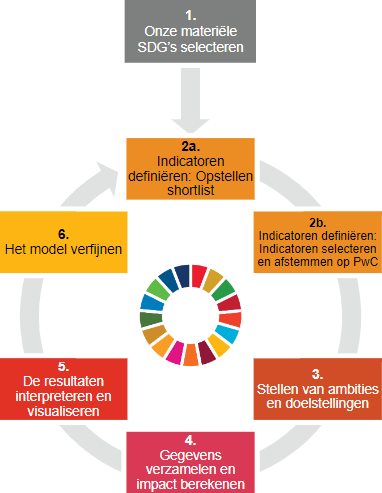
SDG impact measurement in six steps
We have developed a method that provides insight into our contribution to the SDGs. The results of our SDG impact measurement (SDG IM) show our impact in relation to our ambitions and form the basis for a dialogue about our next steps and actions to maximize our positive impact on society

The SDG IM Framework
The SDG IM framework measures our impact on the SDGs. On the one hand, it is goal-oriented to determine whether we have a positive impact on society. On the other hand, it helps us comply with current non-financial reporting standards, such as the EU directive and future legislation from the European Commission, including the Corporate Sustainability Reporting Directive (CSRD).
Measuring the SDG Impact of our Operations Now and our Client Work in the Future
The framework currently covers the direct impact of our operations. In 2022/2023, we made progress in developing a framework to measure insights into our impact across our value chain. In the coming year, we will further develop and refine this framework, aligning it with the CSRD and the relevant indicators of our value chain. With this client framework, we aim to gain insight into the impact of our services.
Overview of material SDGs within our operations


Step 1: Select our material SDGs
The SDGs have been integrated into our value creation process since 2015/2016. The integration of the SDGs in our value creation model demonstrates our contribution to these SDGs. We align our material SDGs with the material topics, focusing on the topics that are most material to our stakeholders. To be most effective and have a greater impact, we also identify focus SDGs. These represent the societal, ecological, and economic topics to which we can contribute the most. The starting point of the impact measurement is the SDGs linked to our material topics.
Step 2: Define indicators: Create a shortlist
PwC's impact consists of three parts: our upstream impact through our suppliers, the impact through our own operations, and the impact through the work of our clients (downstream impact). Currently, our SDG IM framework focuses on our operations. For each of our material SDGs, we create a list of potential indicators from existing reporting standards such as CSRD, GRI, UNCTAD, and IBC Metrics from the WEF. We conducted interviews with experts within PwC, where they assessed the indicators for relevance, contribution to the SDG, influenceability, independence, and data availability. We select the most suitable indicators per SDG and also add PwC-specific indicators. The selection of indicators forms the basis for our SDG impact measurement.
Step 3: Define ambitions and objectives
We have defined ambitions and objectives for our focus SDGs. These provide direction for minimizing our negative impact and maximizing our positive impact. Our ambitions reflect what is needed to achieve the SDGs by 2030. Our objectives for 2024 highlight specific aspects of the ambitions that will require attention in the coming years.
Step 4: Collect data and calculate impact scores
For the selected indicators, data is collected and calculations are performed. The calculations are made in the Responsible Business Simulator, a tool developed by PwC that supports strategic decision-making by quantifying financial and non-financial information. With this approach, all indicator values are converted into a single unit of measurement, allowing for comparison and aggregation of impact scores per SDG.
Thresholds are defined to determine whether each indicator has a positive (green), neutral (gray), negative (red), or unknown (black) impact. Thresholds can be defined by looking at the performance of sector peers, sector averages, or the performance of the Dutch market, or in the case of higher ambitions, our own internal objectives. An explanation of thresholds for positive and negative impact can be found here (microsite).
Step 5: Visualize and interpret the results
Impact measurement inherently contains uncertainties. The landscape of measurement methodologies, tools, and guidelines is fragmented. There is no harmonized approach, and methodological choices and assumptions have an effect on the outcomes. Our framework includes assumptions about thresholds for positive, neutral, and negative impact. It also includes assumptions and calculation methods for evaluating impact in a single unit.
The outcomes of our impact measurement are presented in the bar chart, which provides insight into our relative performance for the SDGs. The green bar represents our positive impact on an SDG, while the gray and red bars represent our neutral and negative impact, respectively. The black bars represent an impact that could not be determined because a threshold could not be defined.
The results of our impact measurement are discussed with the Board of Directors: on which topics are we performing well, and which topics require our attention or further analysis/monitoring.
Step 6: Refine the framework
Our framework for impact measurement includes the direct impact of our operations and the indirect impact in our value chain. Indicators for the impact of our operations are generally more measurable. Indicators that have a broader scope in the value chain are generally less measurable. The further development of the SDG IM framework is influenced by developments in the non-financial reporting landscape, such as the reporting standards according to the CSRD.
| SDG | Ambition for 2030 | Target for 2026 |
 |
Achieve gender balance and equality of opportunity | Yearly target of 35/30% intake and 35/25% promotion of female directors and partners, respectively. |
 |
Achieve sustainable growth within the boundaries of social and environmental systems | We will measure and report insights of our impact through our client work. This will also be part of implementing CSRD for our own organisation. |
 |
Achieve an inclusive and diverse culture and equality of opportunity irrespective of age, disability, cultural background, sexual orientation or other status | Yearly target of 15% intake and 15% promotion of non-western origin directors and partners. |
 |
Achieve a positive environmental impact across our value chain |
|
Contact us

Wineke Ploos van Amstel - Haagsma
Chief Sustainability Officer, PwC Netherlands
Tel: +31 (0)65 170 13 44















